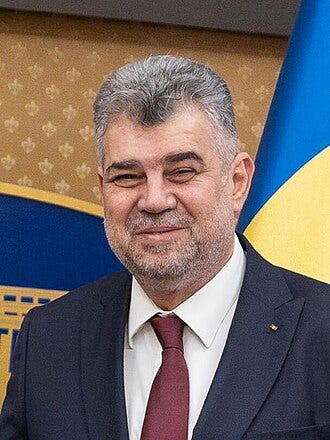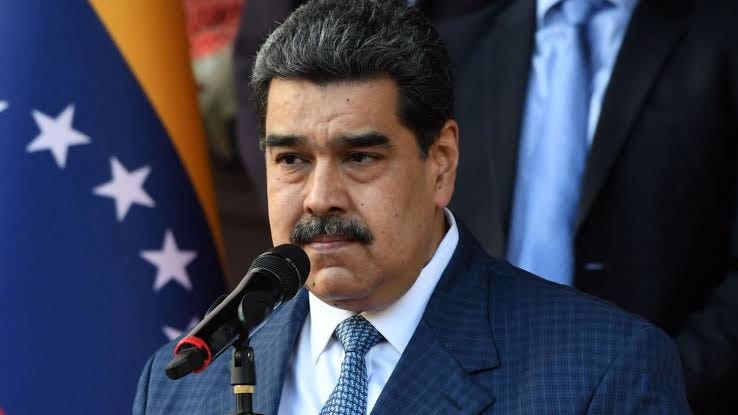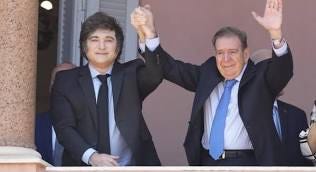More foreign affairs in a crazy, mixed-up world
Part 4: Romanian update; Surinamese update; Venezuela, Argentina, and a stop-the-steal tour
In Romania, the quasi-democratic upheaval continues, with an appeals court upholding the annulment of November’s first round of presidential elections by the country’s Constitutional Court. First-round leader Calin Georgescu had until Monday, January 6, to appeal the appeals court’s ruling on that ill-considered verdict—while Crin Antonescu, once the agreed-upon candidate of the ruling coalition in a rescheduled election, decided he had had enough fun and was out of the running until the four parties came to their senses.
What this means for Romania, the latest democracy to drop any pretense of abiding by rules when the voters balk at the heavy-handed choices being forced upon them, is anyone’s guess.
Antonescu had been seen as a possible savior of politics as usual, after voters clearly snubbed the Social Democratic Prime Minister, Marcel Ciolacu, in carefully-recounted election results. Bur according to one report, Antonescu doubted he had the legitimate consensus standing to represent all four parties as the new mainstream candidate [for context, see “More turmoil in Romania as presidential candidate suspends candidacy,” https://www.euractiv.com/section/politics/news/more-turmoil-in-romania-as-presidential-candidate-suspends-candidacy/ ] .
No smiles these days for snubbed Prime Minister Marcel Ciolacu. Courtesy Government of Romania
According to another report on politico.com, the Romanian government has yet to set a date for a rescheduled election, but appears determined that neither Georgescu nor Elena Lasconi—a reformist mayor, who snagged second place—should count on their top-two finish to vault them once again into the cancelled runoff. As Politico.com saw it,
The scuttled election between Georgescu — a pro-Russia, anti-EU and anti-NATO candidate — and Elena Lasconi, his center-right pro-EU challenger, was seen as pitting East against West in the country. Georgescu’s prior praise of Russian President Vladimir Putin and his threats to halt aid to Ukraine prompted fears that his victory would see Romania drawn deeper into the Kremlin’s orbit. Lasconi, on the other hand, pledged to keep Romania on a path aligned with the West.
[See “Calin Georgescu,” https://www.politico.eu/article/calin-georgescu-romania-presidential-election-appeals-court-upholds-scrub/ .]
Meanwhile, the country remains under the somewhat extralegal control of outgoing president Klaus Iohannis, who extended his own term to await the new election, but whose role as authoritarian glory hog over the past 10 years has witnessed a near-total collapse of voter confidence. He wanted desperately to become NATO secretary general, but lost out last summer to the far more popular former Dutch prime minister, Mark Rutte, and now seems at a loss for other options—staying in office indefinitely seems the only real choice du jour.
The former high-school physics teacher won a resounding reelection in 2019, but soon chafed at the restrictions imposed on his future by his now term-limited status. He began alienating more and more Romanians for his expensive foreign visits and outlandish fashion statements, as well as power-hungry actions more worthy of Hungary’s autocratic Viktor Orban—or Donald Trump, perhaps—than his citizens could stomach. He and First Tourist Carmen often turned up abroad … in Egypt in 2021, the United Arab Emirates in 2023, and foolishly renting a lavish private jet to visit Japan and Singapore in 2023, as I recall … in matching aviator dark glasses and touristy outfits, in a tastelessly extravagant parody of South American banana republics.
A smiling Carmen and Klaus Iohannis in happier days, when the world still looked good. Public domain photo
Who will make it onto the list of “acceptable” candidates in the new election, if, indeed, one is ever held? Will the election even come off? Or will Klaus and Carmen continue to morph into their reviled predecessors Nicolae and Elena Ceacescu, the long-ruling dictator and spouse who had to be hanged by their feet by angry Romanians just to get them out of office?
I had once hoped to visit Bucharest, just to cross it off my bucket list—or perhaps, get some good-quality cheap dental work done. But no time soon, it seems. Stay tuned …
* * * * * *
More news from sad-sack Suriname: Desi Bouterse, the self-styled king of Suriname for four decades, was cremated in early January in a private ceremony, attended by hundreds of supporters, after missing out on a state funeral. He had been in hiding for nearly a year, after failing to appear in a Surinamese court to begin a 20-year sentence for his role in 15 murders of opposition activists in 1982. An autopsy attributed his death to liver failure caused by longtime alcohol abuse.
And in an even more curious twist, Surinamese Vice President Ronnie Brunswijk—a former bodyguard to Bouterse before falling out in the late 1980s—told Caribbean Life that he knew exactly where Bouterse had been hiding during 2024—and had even been in regular touch with him there. He also expressed surprise that Surinamese government officials claimed they did not know Bouterse’s location. [See “Suriname’s VP in hot water,” January 16, 2025, https://www.caribbeanlife.com/surinames-vp-in-hot-water/?utm_source=sailthru&utm_medium=email&utm_campaign=caribbeanlife-pm&utm_term=Caribbean%20Life%20Daily%20Newsletter .]
Desi Bouterse’s casket at his January funeral in Suriname. Photo courtesy Reuters
Predictably, Surinamese officials quickly began a farcical investigation of Brunswijk’s statements—presumably who knew what and when they knew, and why no one else did. Brunswijk also said he did not attend Bouterse’s funeral, because he was not invited.
Bouterse’s death and the government’s subsequent refusal to accord him a state funeral—despite his 10 years as Suriname’s president, from 2010 to 2020—set off angry political ripples in the small South American nation, which he had earlier ruled as military dictator from 1980 to 1987 and later as military chief. His widow, former First Lady Ingrid Bouterse-Waldring, angrily upbraided the government of Surinamese president Chan Santokhi for “disrespect” shown to the family, according to one report in Caribbean Life.
[For more details, photographs, and links to related stories, see “Former military strongman,” https://www.caribbeanlife.com/former-military-strongman-desi-bouterse-laid-to-rest-in-suriname/?utm_source=sailthru&utm_medium=email&utm_campaign=caribbeanlife-pm&utm_term=Caribbean%20Life%20Daily%20Newsletter]
* * * * * *
Another slowly-imploding former democracy pretending to listen to its voters—to its reduced minority version, at least—was Venezuela, where former garbage-truck driver—he claims it was a bus—Nicolas Maduro still planned to take the oath of office on January 10, even after voters resoundingly rejected his bid for a third term in July. Far easier, of course, to throw out dissenters and count the “acceptable” votes in his own way, as it turned out.
Grimly determined to ignore voters’ rejection, Nicolas Maduro plans to steal a third term. Photo courtesy CNN
And to cement his laughable holding on an imploding nation, Maduro’s puppet parliament leader announced his determination to arrest the real winner, opposition leader Edmundo Gonzalez, currently self-exiled to Spain but making the rounds of both North and South America this week on his quixotic version of a stop-the-steal tour. Gonzalez has hinted he would sneak over the border into Venezuela to take the oath of office himself—shortly after meeting with outgoing U.S. President Joe Biden at the White House.
Gonzales greets the public with Argentine president Javier Milei. Courtesy AP
This despite the suspicious kidnapping last week of his son-in-law by armed gunmen, or the $100,000 bounty on his own aging head—not the worthless bolivar, mind you—funded by Maduro from the bankrupt nation’s looted treasury. With crude oil holding last week above $74 per barrel, even Venezuela’s horribly-managed oil industry is still able to acquire some foreign exchange, apparently, by transporting the precious material aboard “dark fleet” tankers, perhaps those flagged by friendly nations nearby—perhaps even Panama or Barbados. [See “Venezuela Doubles Down,” https://abcnews.go.com/International/wireStory/venezuela-doubles-intention-arrest-opposition-leader-claims-defeated-117350231 .]
Nearly 8 million Venezuelans have fled the nation’s boundaries in recent years, many of them since 2018, seeking political asylum elsewhere in South America—and now, the United States—as recently as 2023, according to a 2023 report by the Center for Strategic and International Studies. This represents a mind-blowing 25 percent of the former democracy’s population in 2013, when he won his first special election after succeeding the late Hugo Chavez in 2012. [See “The Persistence of the Venezuelan Immigrant and Refugee Crisis,” https://www.csis.org/analysis/persistence-venezuelan-migrant-and-refugee-crisis .]
No one—except, notably, amenable Argentina—seems to want the poor Venezuelans for very long, sadly, with many choosing to head north from temporary homes in exile in Colombia, Peru, and Ecuador—all of whom have their own domestic problems, both political and economic. More than half are hovering indefinitely in Colombia, next door.
But Buenos Aires, where Gonzalez held President Milei’s hand aloft in January, currently hosts about 300,000 Venezuelan refugees, and “is among the most receptive countries towards refugees in the world,” according to a report from Refugees International: “Argentina stands out as a welcoming place for Venezuelans. Argentina’s laws recognize migration as human right and guarantee migrants’ access to basic social services, work, and justice.” [See “Argentina’s Welcome,” https://www.refugeesinternational.org/argentinas-welcome-of-venezuelan-migrants/ .]
Mr. Milei, a former economics professor famous for his flamboyant behavior and curiously eclectic political pronouncements, has been president since 2023—but recently hinted at future plans for his own migration to Europe, after applying for and being granted Italian citizenship weeks before Gonzalez’s visit, on the basis of his parents’ Italian heritage. If he does move to Rome, the onetime Catholic—who seems ready to convert to Judaism—would certainly run afoul of another famously-unmarried Argentine in residence nearby, at Vatican City, Pope Francis, also of Italian ethnicity, and the object of Milei’s increasing scorn.
Along with many displeased Western nations, Argentina has simply rejected Maduro’s phony declaration of victory, leading to the collapse of diplomatic relations between the two nations in July. Other South American nations with whom Venezuela suspended diplomatic ties over the matter included Chile, Costa Rica, Peru, Panama, the Dominican Republic, and Uruguay—and only last week, for some reason, adding Paraguay.
I have yet to make it to Buenos Aires—another destination I just missed out on seeing while in Suriname, when visiting friends urged me to meet them there—but maybe one day …
Meanwhile, Venezuela and the United States continue their uncomfortable diplomatic standoff, with stilted relations and U.S. sanctions, first imposed in 2005, still in force. Venezuela closed its embassy in Washington, D.C., in 2019, when the United States declined to recognize Maduro’s first botched reelection. The former U.S. embassy now handles relations with Caracas through its Venezuela Affairs Unit in Bogota, Colombia. [For background, see “Venezuela: Background and U.S. relations,” https://crsreports.congress.gov/product/pdf/IF/IF10715#:~:text=Since%202005%2C%20the%20United%20States,%2C%20antidemocratic%2C%20or%20corrupt%20actions .]
The U.S. “bounty” on Maduro’s head has also been increased by the outgoing Biden administration to a jaw-dropping $25 million, even while Venezuelan oil still manages to trickle into U.S. hands—almost 1 million barrels per day, presumably aboard legitimately-flagged vessels. This despite energy sanctions first imposed by President Donald Trump in 2019, and softened somewhat, if sporadically, by President Joe Biden after January 2021, according to a Reuters report.
Despite the still-plummeting economy—annual inflation was still 200 percent as recently as 2023, at least down from a recent high of more than 1,000 percent—crude oil production in Venezuela actually rose by 10 percent in 2024, with Chinese customers second only to U.S. purchases. [See “Venezuela’s 2024 oil exports,” https://www.reuters.com/business/energy/venezuelas-2024-oil-exports-climb-105-amid-political-turmoil-2025-01-03/ .]
I have yet to visit Venezuela—I missed my easy chance in 1989, when KLM actually flew from Paramaribo, where I then lived, to Caracas—but was always told it was a “fun” place for tourists, before Hugo Chavez took over in 1998, at any rate. A Foreign Service friend of mine began her career in Maracaibo, when I was assigned to Kingston, Jamaica, and seemed to enjoy her tour. But that was when it was a functioning democracy, rather than the poorly-drawn caricature of one we see now.
Even under Chavez, another FS pal of mine loved to vacation with friends on Isla Margarita, after she retired to Arlington, Virginia. Now the Department of State is warning Americans not to travel anywhere in Venezuela at all—in a damning Level Four advisory—”due to the high risk of wrongful detentions, terrorism, kidnapping, the arbitrary enforcement of local laws, crime, civil unrest, poor health infrastructure.”
I doubt Venezuela will ever be fun again, at least in my lifetime, so this potential tourist is forever lost to Maduro’s collapsing playground as a madcap vacation destination. With Trump scheduled to reassume power 10 days after Maduro’s illegal ceremony, on January 20, Venezuela may well again lose its largest oil customer, and be reduced to using “dark fleet” tankers only—and losing valuable foreign currency to fund terrorist bounties. So stay tuned …
* * * * * *
In future blog entries, I plan to highlight some of the other Level Four nations around the world, where Americans are warned not to travel, mainly because of war conditions, high crime rates, political instability, or equally unpleasant dangers. At last listing, Afghanistan, Belarus, Burkina Faso, Central African Republic, Haiti, Iran, Iraq, Libya, Mali, North Korea, Russia, Somalia, South Sudan, Sudan, Syria, and Ukraine joined Venezuela on the list.
None of them hold any particular appeal for me as an aging tourist. Anything above Level Three—which sadly, includes my beloved first Foreign Service posting of Jamaica, and nearby Trinidad and Tobago, both because of high crime levels, and Egypt, for its risk of terrorist attacks—makes me shake my head. With so little time left on this earth, I will concentrate on more manageable destinations—preferably without high street crime.
I have previously paid brief visits to three of those Level Four countries—Haiti, Russia, and Ukraine, all in the late 1980s—and dealt with my stopovers there in previous blog entries. Syria, now in the process of rebuilding itself after a half-century of dictatorship, I have already described, as well.
Few of the rest hold much tourist appeal for me on the best of days. But maybe I will start with Belarus … the Soviet-era holdout in Europe, still dominated by Russia … at least, if it ever tries to join the rest of modern Europe by dumping its buffoonish Stalinist-clone of a dictator, Alexander Lukashenko. Until then, I will stick with the rest of Europe …
Next time: Greenland and the hubris of historical illiteracy








